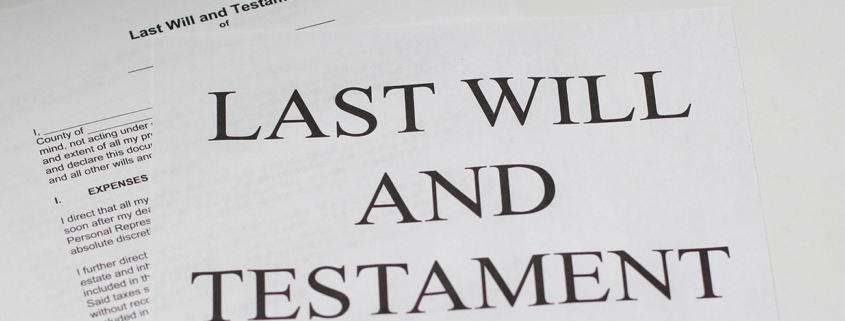Wills, Trusts & Estate Planning
This article is meant for informational purposes only and is not legal advice. Please consult an actual lawyer for your will, trust, or estate planning needs.
As you reach retirement age, it is important to make sure that your affairs are in order. Handling things such as wills, trusts, and estate planning can be tricky. You will want to consider hiring a lawyer or accountant to help you make sure everything is done correctly. Our goal is to introduce you to the basics.
Wills
What is a will?
A will is a legal document that expresses your wishes for what happens with your property after you die. You can name an executor (who makes sure the will is followed), a guardian for your children, and more. Say you want to leave property to your children, but they aren’t legally adults yet or you want them to only receive it at a certain age. You can set up some sort of property management to take care of that. You can even forgive debts, if you so choose.
What happens if you don’t have a will?
If you don’t have a will, then the state law will decide who gets your property. This often goes to your closest relatives, but if you don’t have any the property goes to the state. This is pretty rare. Any debts owed by the estate will have to be paid before the state will distribute the property.
Dying without a will is referred to as dying “intestate”.
What do you need to make a will?
It is possible to write your will yourself, or you could have an attorney draft one for you. For it to be legal it must be in writing, you must be at least 18 (though age varies state to state), you must have what is called “testamentary capacity” or have the mental competency to execute a will, it must be signed by a testator and at least two witnesses who are receiving nothing from the will. Some states may require you to make a self-proving affidavit, which helps the will get through probate. The affidavit has to be notarized, the will itself does not.
You can also create a “holographic” will, which is one that is in your (the maker) own handwriting. These can be problematic and are only allowed in certain states. The biggest challenge comes with proving the validity of the will in probate court.
What is probate court?
Probate court is the state’s way of ensuring the estate pays its debt/tax obligations and that the property goes to the correct people. It can be expensive and time consuming, especially if there is a lot of debt. There are things you can do ahead of time to either minimize your time in probate or avoid it altogether.
Things to ask your lawyer about:
Make sure they are up to date on all of the laws pertaining to property disposal, including what your spouse and children have a right too. A lawyer can help you navigate all of the state laws that affect what you can do with your property.
You will also want to make sure they explain to you how you can change and contest the will.
Ask about the duties and requirements for someone to be a personal representative or executor before naming one.
If there is anything you are wondering about, ask. If they don’t have the answer, ask if they know someone who does.
Trusts
What is a living trust?
A trust is when you arrange for one or more people to manage/take care of property for someone else. If it is created during your lifetime, it is called a living trust. While you are alive you can transfer the title for your property to the name of the trustee of that living trust. This can help make sure property is distributed more efficiently after your death.
When you put property in a trust, you no longer own it. The trustee owns it. If you have an individual trust, you don’t need any permission to transfer property in and out. If it is a shared trust, you will probably need your co-trustees consent before transferring property. You can also put property that you still owe money on into a trust. In this case, the beneficiary becomes responsible for the debt when they receive the property.
Whenever you get married, divorced, have or adopt a child, move states, or your financial status changes significantly, one of the beneficiaries dies, or one of your trustees dies, you should amend your living trust.
Living Trust vs. Will
Even if you have a living trust, you still need a will. The will takes care of any property you have that is not included in the trust. It also allows you to name a guardian for any minor children you have.
Taxes
Any estate under $5 million in value is not subject to federal estate taxes. You will want to talk to your attorney about any state taxes that might affect smaller estates.
Loaning from the trust to a beneficiary
You can only make a loan from your trust to a beneficiary if the document explicitly says it is allowed. You can also allow the beneficiary to repay the loan with money they would otherwise have received from the trust.
Another thing you can do is allow the trustee to make payments on behalf of the beneficiary, such as for a child’s college tuition.
Ask your attorney about:
Your biggest concern is going to be the state laws regarding estate taxes, followed by making sure the language in the trust itself allows it to be used the way you want it to be used. It is possible for you to form a living trust on your own, preparing and filing the legal paperwork.
You may want to consider consulting with a license attorney if:
- You have questions you can’t answer on your own
- Your estate faces a significant tax burden
- Or your spouse or children might challenge your trust.
Estate Planning
Estate planning covers both wills and living trusts. If you are going to hire outside help, here are a few things to consider:
- What is their experience with trusts and estates? The more, the better
- Will they allow you to review all of the estate planning documents? If not, why not?
- What is the process for updating and maintaining your plan?
- Is there anyone else (qualified and experienced) you can contact if you have a question and they are unavailable?
- What is the process for trouble shooting? How do they contact you?
It may feel like a lot to deal with, but you do not have to do it alone. There are plenty of people who are qualified and willing to help. Do some research and write down all of your questions ahead of time so you are prepared and ready to get the help you need.
It is never too early to think about your future, and your children’s future.





Thanks for the tip to ask about their experience with wills and living trusts. My husband and I want to plan our estate soon. You made me feel more prepared to find the right lawyer to help us.
I didn’t realize that estate planning can help with handling wills and living trusts. My parents are getting ready to retire, and establishing a will is something that they want to make a priority in doing. I think estate planning would help them as they get close to retirement, so I’ll suggest they find a lawyer with experience that can help them in this field.
My dad has been thinking about doing up a will since he is a bit older. As you said here, it would be best to have an attorney help you make a will. That way, there wouldn’t be any mishaps after the will holder passes away.
It makes sense that estate planning and wills can be tricky. My uncle is about to retire and he’s trying to figure out what his options are to make sure his affairs are in order. We’ll have to look into probate attorney services.
I never knew that you still need a will even if you have a living trust. My husband and I are getting older and want to look into what insurances we need and any other documents. We will keep these tips in mind when looking for a professional.
I didn’t know that estates under $5 million in value aren’t subjective in the federal estate taxes. Our mom is getting old and she wants to settle all the proper distribution of her properties equally to her children. She is asking for my help in looking for an estate and trust lawyer that can draft her will and be able to get back in touch with her to sign the documents or to update them if there are any changes.
Thank you for sharing your thoughts!
Thanks for explaining how your will allows for your loved ones to receive the things you leave behind. I would like to make a will in case something were to happen to me or my wife. I want my children to inherit everything but I know it can be tricky process without a lawyer’s help.
My aunt’s health bis already deteriorating, which is why she’s currently looking for an estate planning attorney that may help her write a Will and trust. Well, thank you for elaborating here that she must ask about the duties and requirements that her chosen representative must obtain. I’m also glad that you were able to elaborate here the there’ll be state taxes.